Whew, having recreated the deleted day, I can move on.
Breakfast at the Inn. Susie said she’d awakened thinking how lucky we were to be in a country at peace. However real the issues might be, people were not getting up every day afraid that they’d be shot, as was true in many places.
We drove to meet with municipal officials in the Ahafo Anno South Municipal Assembly to explore possibilities for working together. They were extremely friendly and open to the idea. The most significant thing to come out of the meeting was that they gave us a copy of the 200-plus page report assessing their work in the past and containing plans and recommendations going forward. The Kipharts had not had a meeting like this with government officials in the past and the discussion was again ably managed by Sola.
Another car problem, this one not serious. Joseph drove our van too close to an oncoming vehicle, and our side view mirror was sheared off. After trying unsuccessfully to repair it, Joseph put the mirror into the van, to be affixed again at a later date.
We next drove to Abasua in the south of the Ashanti region. The chief there is one of the Kipharts’ favorites, as he seems to exercise real leadership and move things forward. For example, unlike other villages, he has all of his acreage being farmed. We sat with the chief and elders in the shaded courtyard of his house, then walked by the river on which the village sits and around the village grounds. We passed a very modest and rather charming Catholic church. Religion is almost everywhere you look in Ghana.
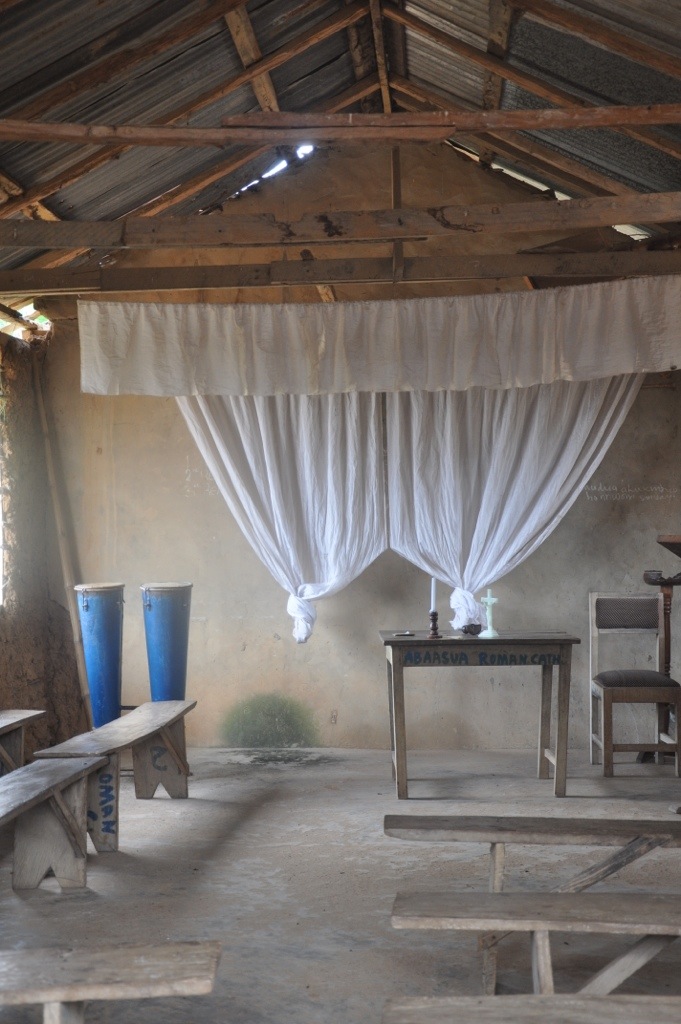
As we drive around, we are constantly reminded of the enormous difference between the Olopades appreciation of the situation and ours, not because they tell us that directly, but because we listen to their observations. Having grown up in rural villages in Nigeria, they understand what is going on and why in ways that we simply cannot. They have lived it. So, it is invaluable to have them along as guides and interpreters. Though the areas we travel in appear to us to be extremely poor, Sola looks out the window and says, “I see money everywhere.” He is looking at the expanse of land, the many crops, some cement buildings and electricity in most places. To him, these signify wealth.
We moved on to Bonkwaso, another village the Kipharts had supported over the years. The chief had been at the morning meeting and greeted me warmly.
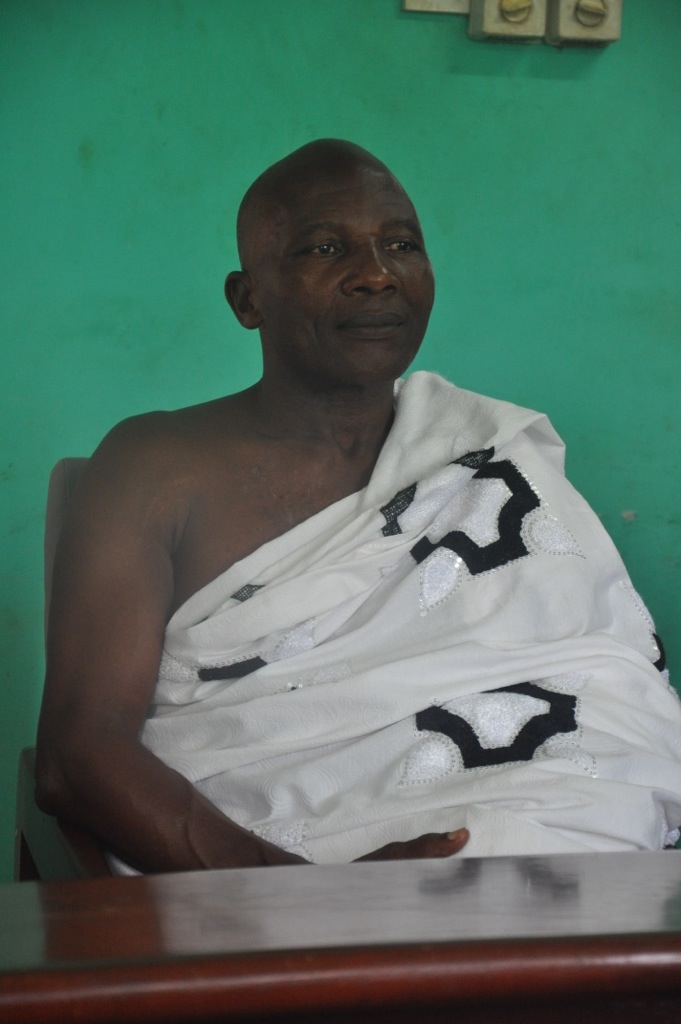
Last year he’d given me a very nice walking stick and announced that we were brother nanas (chiefs). As we were gathering for a ceremony, and had done the ritual handshaking, we saw Sandra, an eight year old girl who we’d seen two years ago, shortly after she broke her arm.
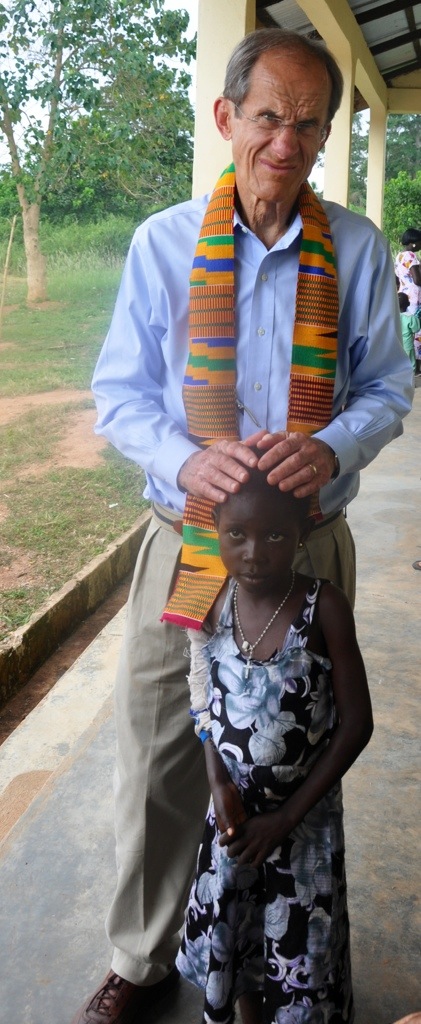
The Kipharts had provided money for her to be taken to a hospital and treated, but instead, she was treated with local remedies and infections had developed and festered. Last year the Kipharts had again tried to arrange for treatment, but she looked to be in pretty bad shape, the poor little girl having undergone two years of mistreatments and pain. My-brother-the-chief had a number of requests for items that he wanted help with, but Dick told him that he was not getting another penny until Sandra was cared for. Dr. Annie says that if Sandra is brought to her in Kumasi, she will see that she is treated. I think the chief got the message, but we’ll see next year whether this terribly sad story is remedied. Just as we were leaving a rather young man who had returned to work too quickly after a hernia repair collapsed and had to be rushed into a truck to be taken to the hospital.
We drove on to see Vivian the midwife at her clinic. Two years ago the clinic had been run by a saintly midwife named Anna who had delivered more than 2000 babies, and never lost a mother. We and the Kipharts were shocked when we got word six months later that Anna had died. When we visited last year, we were very pleased to see that Vivian (who the Kipharts had actually met several years earlier) had taken over. Carol and I had made a contribution to the clinic which Vivian was quite grateful for. A special treat that Anna’s two daughters were at the clinic, so we got to meet them. One looks exactly like Anna, and was the one who called Vivian when Anna died to ask if she could come to take over.
I just realized that I haven’t said anything about the beautiful children. We haven’t seen as many of them as in past years, because school is not in session, but we still have seen a bundle. Here are just a few.
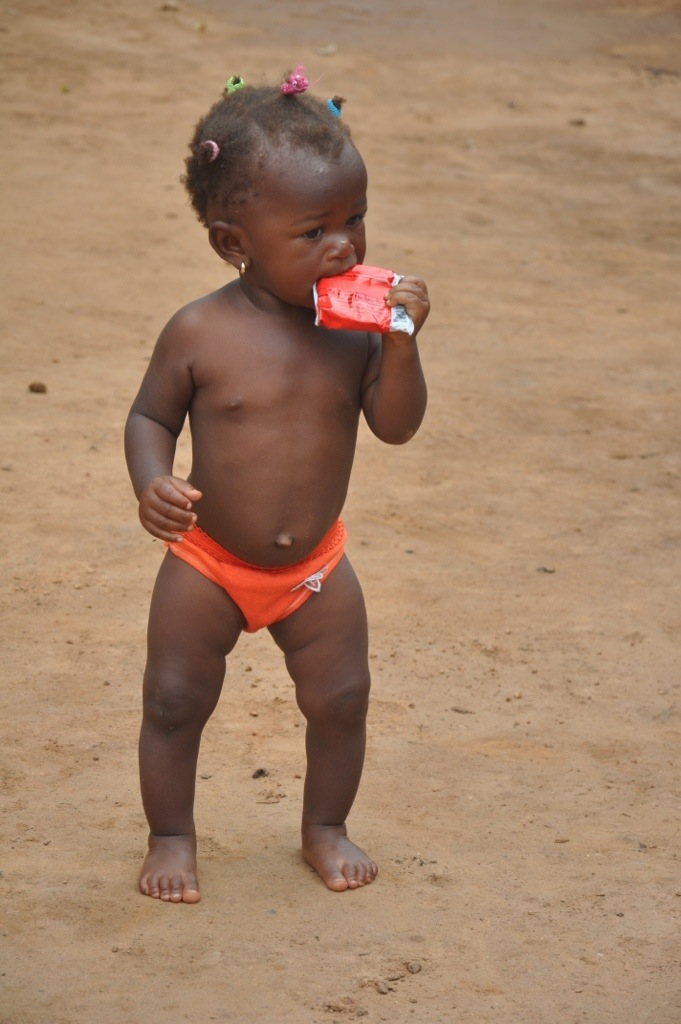
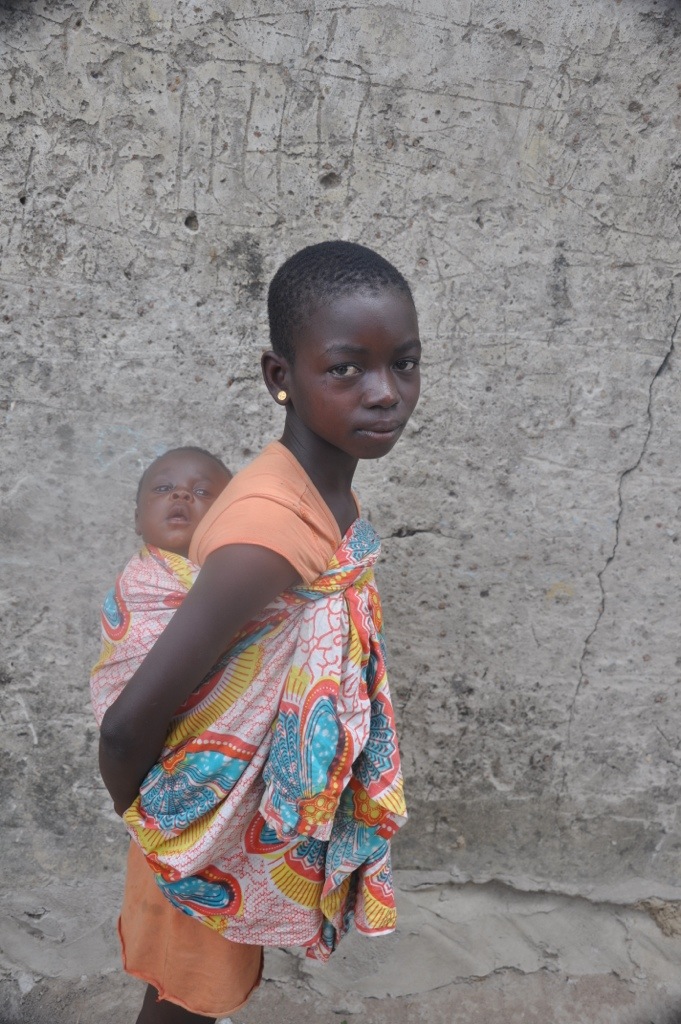

We had dinner back at the Inn, joined by Dr. Annie and Dr. Addae, to whom we bade farewell after dinner. We then spent another half hour or more debriefing the day and talking about plans for the future, including ways to provide the over-worked Dr. Annie more administrative help.
Well, Tuesday was a fabulous day, and I wrote it up in great detail while it was still fresh in my mind. Unfortunately, though, you’re not going to learn all that much about it. Bloggers nightmare: I managed somehow irretrievably to lose it. So, I’m just going to be able to give you overall impressions, plus whatever specifics I can recall (or make up; after all, how will you know?).
Breakfast at the hotel, with more interesting conversation that ranged from home schooling to the work that the Global Health Initiative, under Sola’s direction did in Haiti, assessing needs, sending people in needed areas of expertise and providing aid of about one million dollars in personnel and goods in an effort to avoid epidemics.
Rain meant that we were likely to have a very muddy day, so I went with Jonathan, Benjamin and Joseph to get boots, while the others drove ahead to Krapa. While I was sorry to miss the conversation en route, I did get the experience of walking around the market, with it’s array of goods ranging from refrigerators to fish. A sign of the times was twenty or more people selling cell phones out of stands created in the back of their cars. I was also able to get shaving and after shave, because when I got my bar back, I’d discovered that the only thing missing was the shaving cream I was sure I’d packed, which the Monrovians apparently had pilfered, at the same time spilling the small vial of after shave. Bet you didn’t know that about Monrovians, did you?
Arriving at Krapa, the place looked deserted as compared to previous visits, because school was out and so there were no swarms of smiling faces, pushing to have their photos taken. Susie felt from their look around that things were not going well. Mathis had been a place, where last year we found that the building the Kipharts had donated had not been used for a grade school, as intended. A brave young headmaster, Philip had spoken in front of the acting chief and his cousin cataloging problems there. Later, he courageously went to the head chief, who intervened, supposedly setting things straight. At a meeting later in the day, we’d have an opportunity to find out how things were.
I was driven a short distance to see the second “Carol and Arnie” well, which we’d contributed after our last visit.
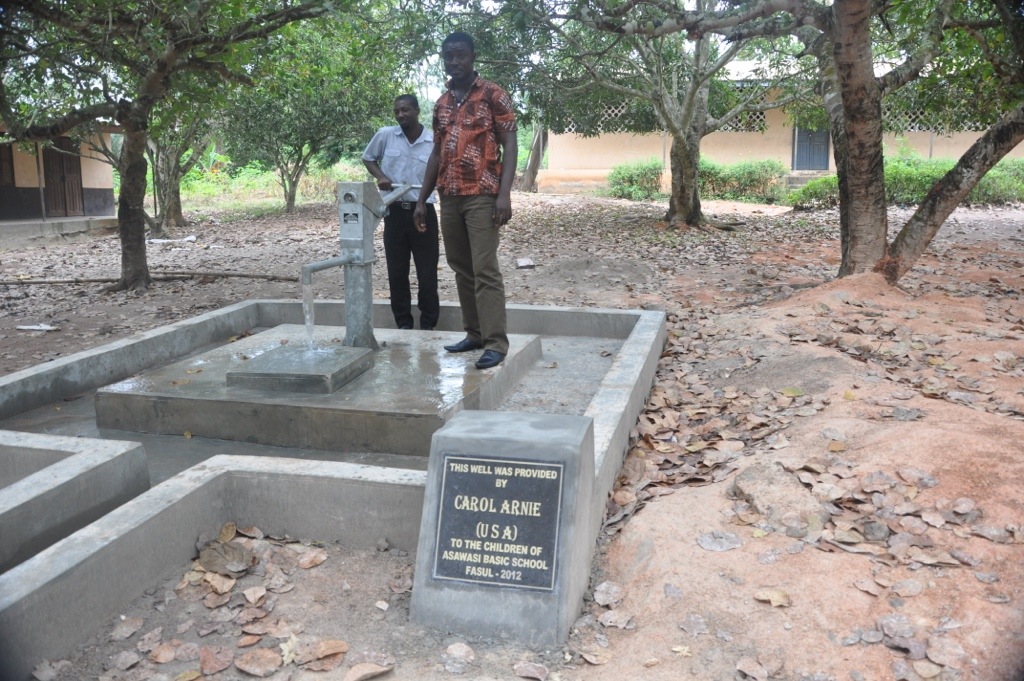
Later in the day, we’d drive by the Valerie and Michael Lewis well that our friends the Lewises contributed. Valerie was with us on our trip last year.
Drove on to Nkyerepoagso, where we saw the laborious process of making palm oil by hand, the young mother of four sweating as the pulp (later used as fuel) was ground to produce the oil.
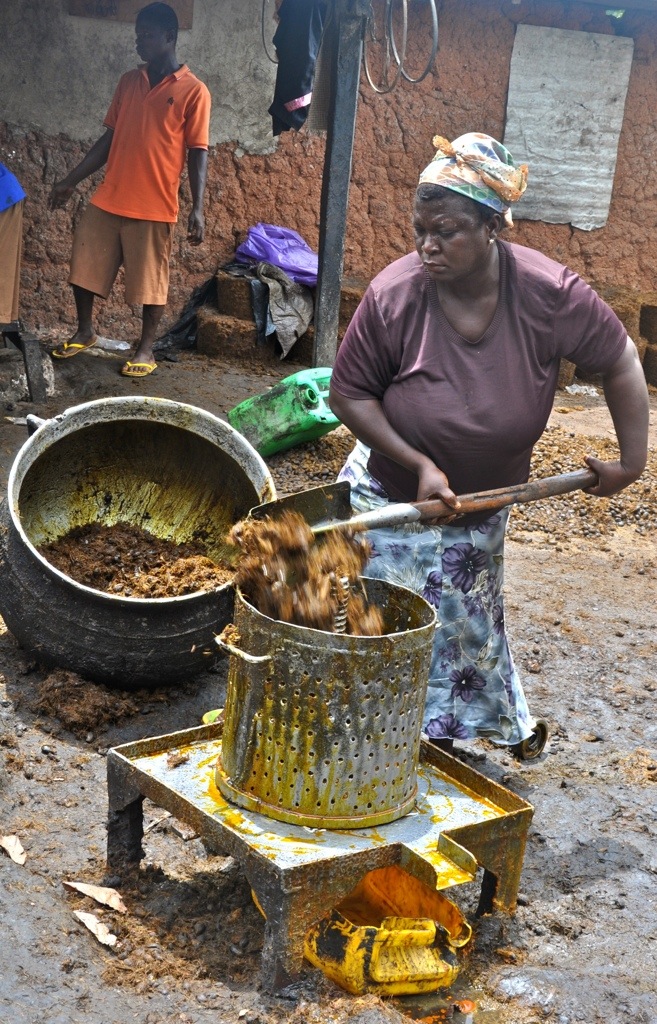
As we walked around the village, we saw an unventilated kitchen, where cooking was done. Sola, a pulmonologist, said that there were two million unnecessary deaths caused annually by this indoor pollution. Sola said that cooking indoors was a more dangerous health hazard than smoking. Another health issue was added to the Kipharts list.
At each place we visited, Funmi asked questions about whether health workers visited and whether the children had been inoculated (yes, and yes) and asked people to show their cell phones, which they had. So, in a real sense, we were doing field work to test what we’d been told.
Here’s Funmi in her stylish hat.
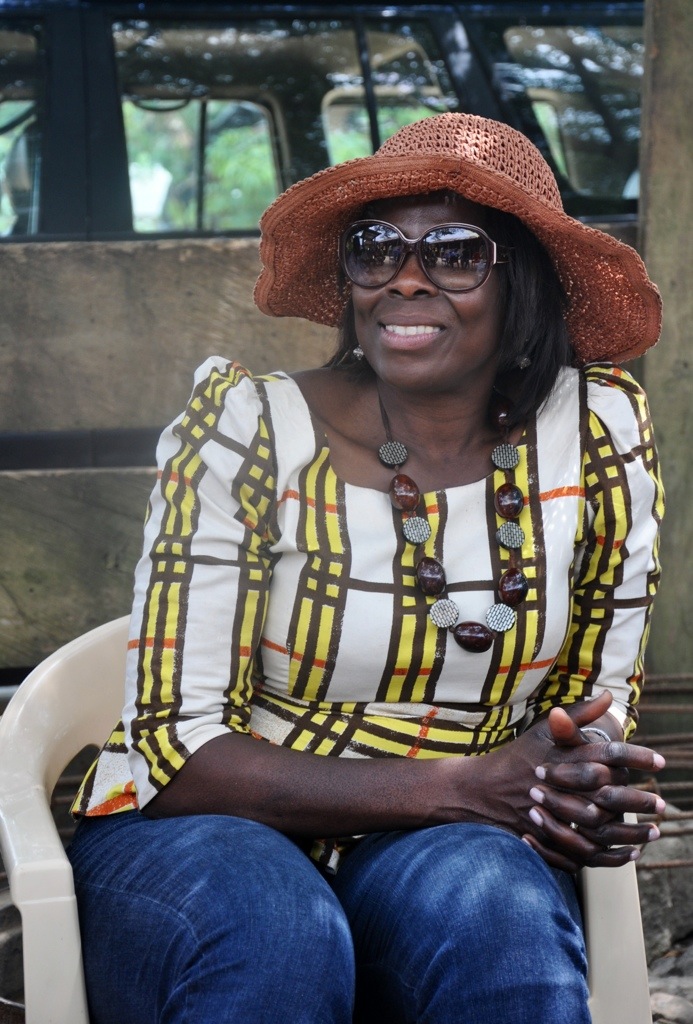
In a ceremony typical of the ones held wherever we went, the chief and elders welcomed us by forming a line and walking by us to shake our hands, each one of them saying “you are welcome” as they passes. Later, we would form a line to do the same, in reverse. We would be asked our “mission,” why we were there, which Peter would reply to. Speeches would follow. Gifts were given (the Kipharts had brought duffles of soccer balls, candy, uniforms, etc.), and sometimes we were given gifts, too. Ceremonies were cut short on this trip, because of the number of places we were visiting. In one village, the Kipharts gave the children toothbrushes made by a company he’d invested in.
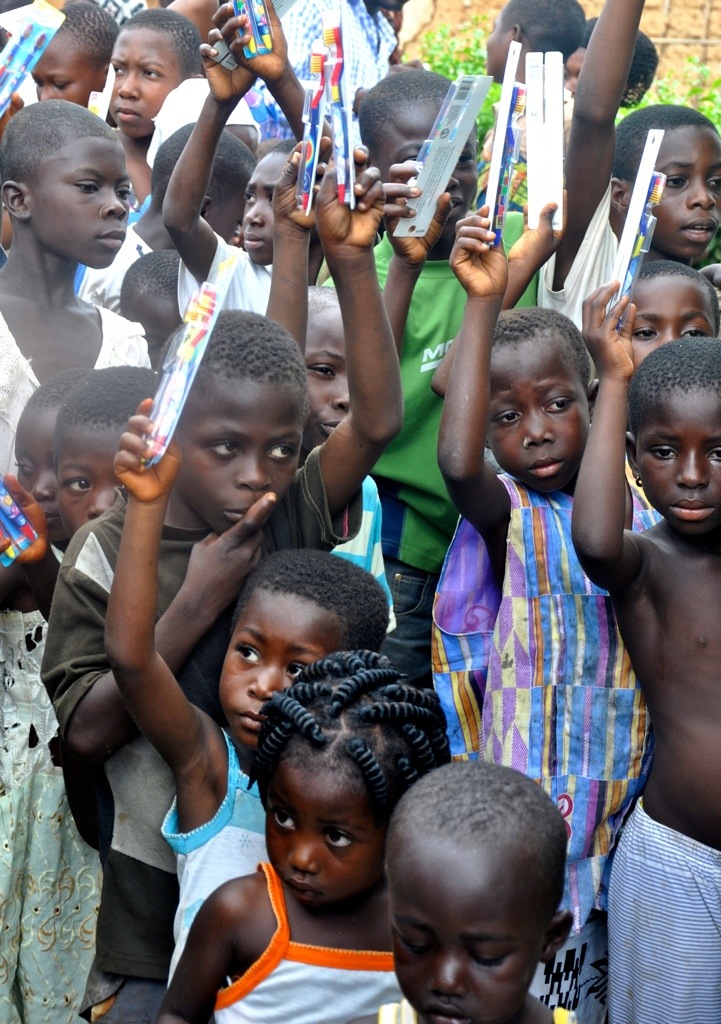
We moved on to the cocoa farms at Adowa, where much of the crop was in harvested because of manpower shortages. At a well in the village, young children were pumping water from the newly constructed well.
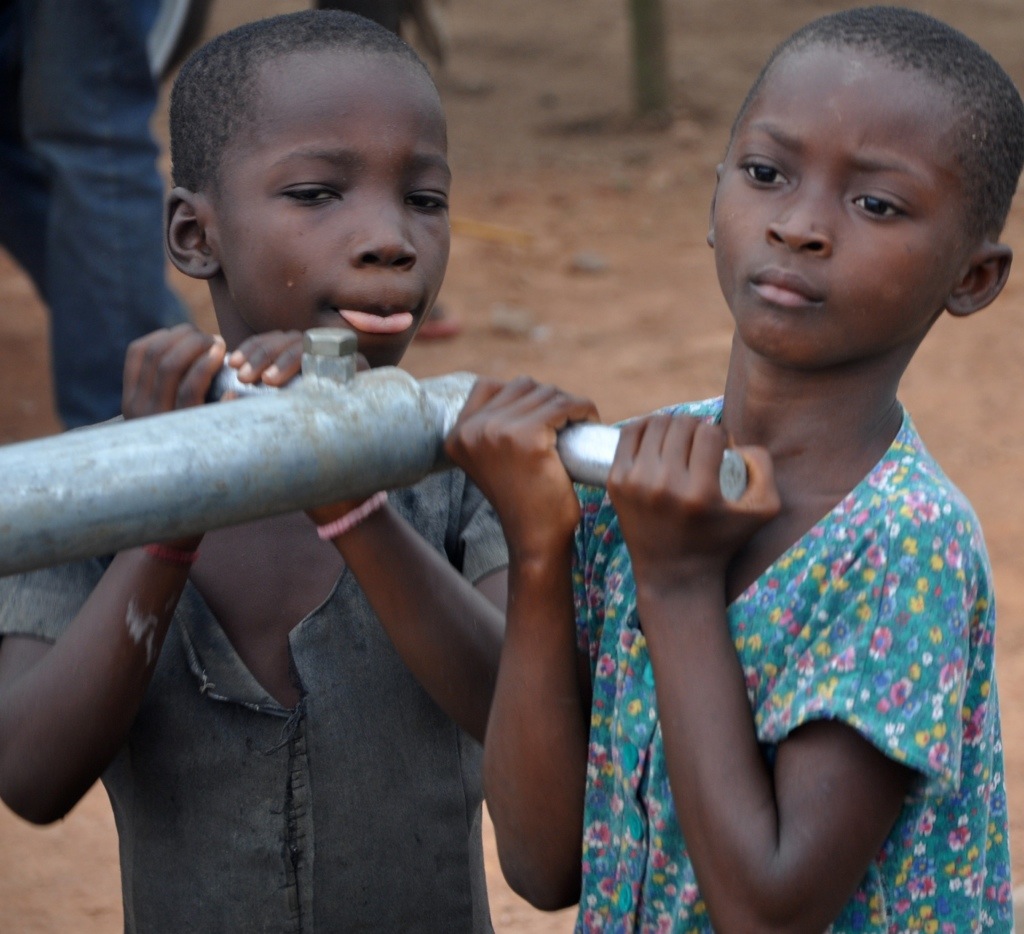
Next to the village of Prophet Emanual, the 96-year old prophet we visited each time. He is in remarkable shape, carrying himself erect, alert and energetic. He told us of how when anyone came to visit him, he told them of the great work Susie and Dick had done in building a well and a school. He blessed us in a very musical sounding blessing.
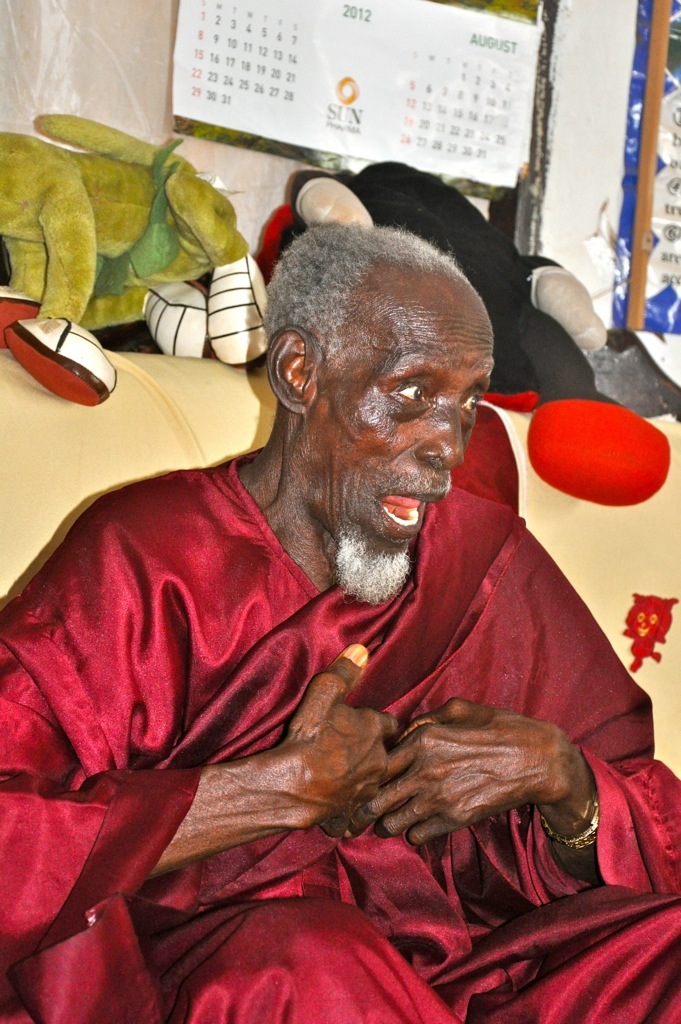
As the others walked around the village, I was able to spend more than half an hour asking the Prophet questions, Peter acting as my interpreter. We covered a range of things, the Prophet sometimes choosing to answer the question he wanted to, rather than the one I’d asked, in the manner of a US politician (though this was probably due in part to translation problems). The overall sense is one who believes genuinely that he hears the voice of god and is guided by visions, capable of bringing dead people back to life, curing the disabled and providing advice to the new president of Ghana. He has no regrets and, when asked about problems a prophet faces, he said that when he traveled he was sometimes concerned as to whether the vehicle he traveled in would make it. When he died, he said he would reveal which of his sons would succeed him as prophet. He declined my request that he tell me that now.
Next we went to Manhya, where the Kipharts had built there first well. There had been problems on and off there, but a warm relationship with the chief and elders prevailed.
We then drove to the home of the 80-plus year old head chief in the Krapa area, who has been enormously supportive. His nephew, the acting chief, seemed to be a good deal friendlier than last time, and the impressive young headmaster who joined us reported that everything was now good in the school, though he was working on the challenge of improving their students’ test scores.
Because of the lateness of the hour, we went, feeling quit grundgy, directly to the Golden Tulip hotel, where a dinner for 25 (which became 35) had been arranged. Most of the others arrived much later, so we could have gone to the Inn to freshen up. Eventually representatives from schools, health providers and government arrived, and, after dinner, Sola expertly led a discussion among participants about how everyone could work together. While we’d had these dinners on prior trips, no worthwhile exchanges had taken place. We were all struck by the very impressive head of the school district, Gertrude, who raised the possibility odd accelerating change greatly, through computers. New will definitely stay in touch with her.
When we returned to the Inn, we spent half an hour debriefing the day, before retiring, exhausted.
After the rough arrival, our first real working day was a decided step in the right direction. Slept well, and courtesy of a loan from Dick, was able to put on fresh clothes for the day.
After a good breakfast at the Inn, we set out for Dr. Annie’s clinic in Kumasi, heavy city traffic making the short drive take at least half an hour. Ida joined us (“us” generally means the Kipharts, the Olopades and Peter). We learned, somewhat surprisingly, that all seven of our bags had been located in Accra and that Jonathan had picked them up and was headed our way. Apparently, our bags had decided that they would get a kick out of flying to Morovia and back yesterday. I’m hoping that they had a great time there.
Every aspect of Dr. Annie’s clinic is a huge beehive of color and activity. From the maternity ward, where six mothers who have just given birth and their less than twelve hour old babies lay stretched out on cots, to clinics for well babies some of whom were brought in by grandmothers or sisters of deceased mothers, to a laboratory, to the room where powdered compounds of baby food are put in transparent sacks to places where babies are weighed and inoculated. A few photos may give you some sense of the place, first one is of Dr. Annie:
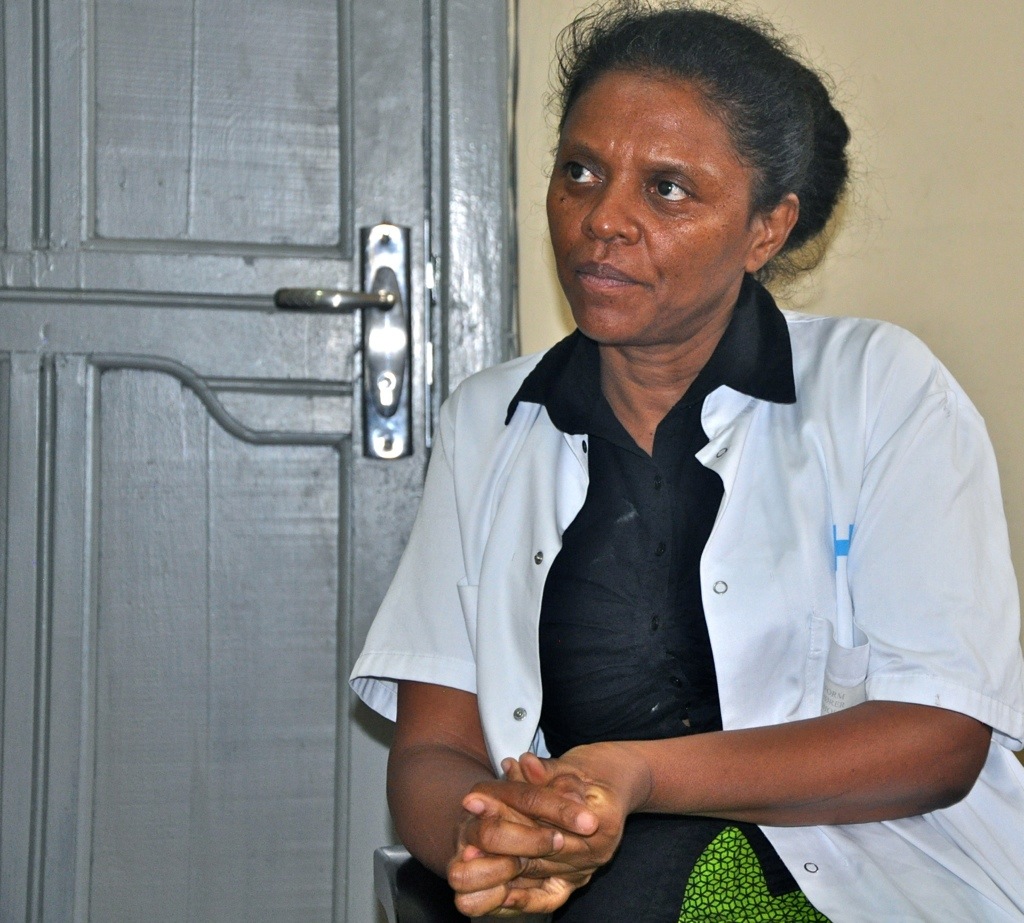
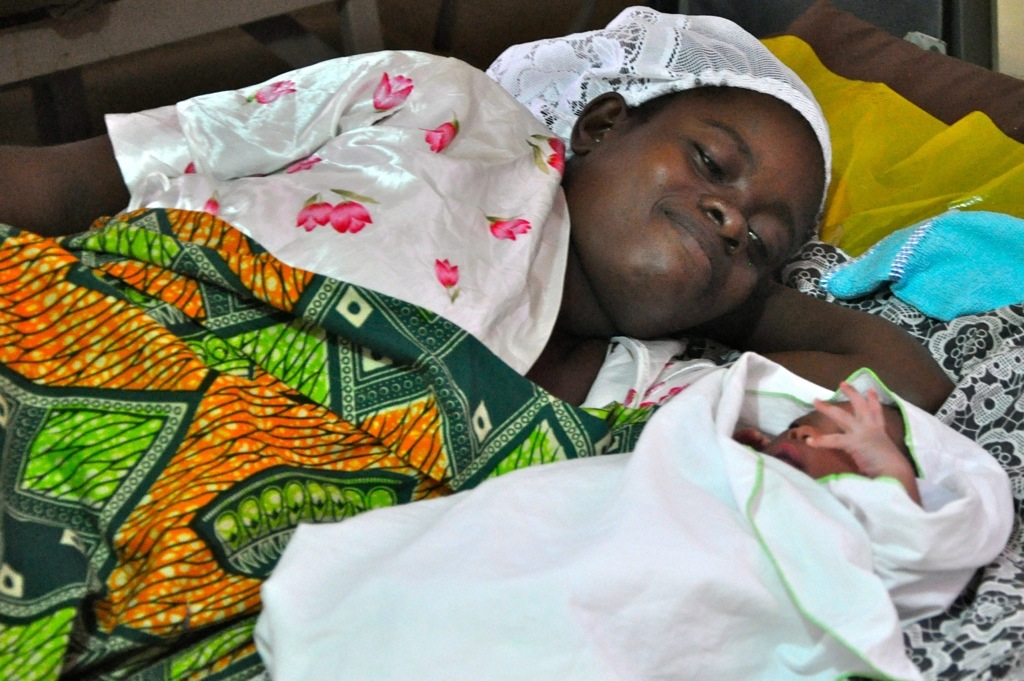
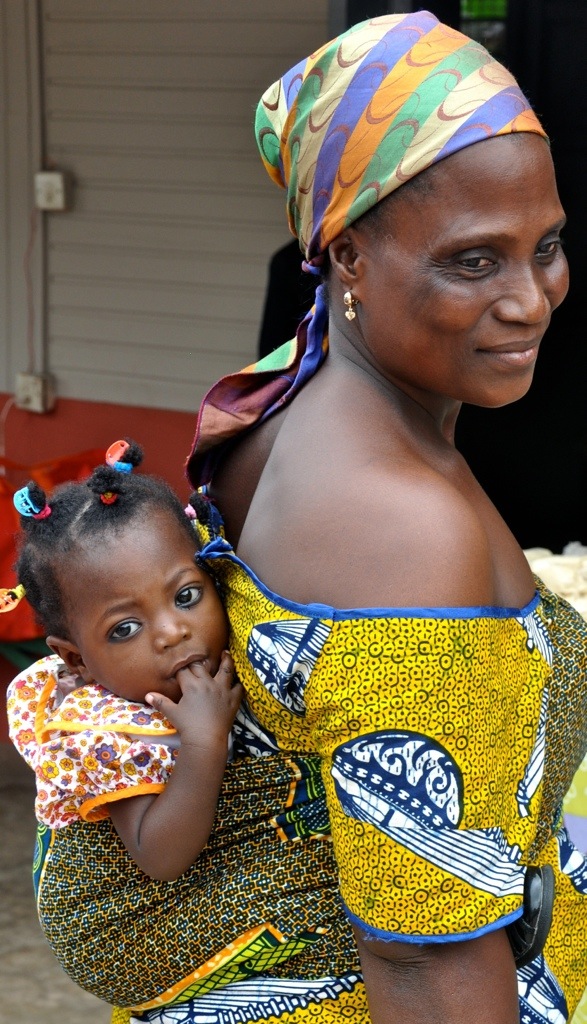
Having been here three times, it’s fascinating to see the changes/improvements in the clinic financed by the Kipharts, by a foundation in Spain who the Kipharts introduced Dr. Annie to, the Ghanaian government and the Lakonishoks (other Chicago friends of the Kipharts; Margot went with us to Ghana two years ago). The entire place is bustling and, as Funmi commented, the children all looked clean and well-dressed and the mothers (or mother substitutes) engaged and attentive. Though clearly it could benefit from some further administration, Dr. Annie has done a remarkable job.
We spent a few hours at the clinic, shown around by Dr. Annie, who explained what was going on in each area. After this, Ida left and the rest of us went out for lunch at a restaurant in Kumasi.
Having Sola and Funmi along is fabulous. They are fun companions, for one thing. But way beyond that, they are extremely knowledgable, about what we are seeing in specific places we meet, about how to accomplish change in a global health environment and about the culture of West Africa. Their observations are astute, their questions direct and their sense of humor lively. Their contributions are central to making this trip work.
It’s tough to report on (or even remember) the many and diverse things we talk about en route. To give some idea, though, here are some topics I recall from today: growing up in Nigeria, their very talented children–Feyi, Dayo, Tobi, all in their twenties and in the US–the support families give to mothers in their homes in West Africa for forty days after they give birth, end of life issues, the importance of paraprofessionals in the medical (and other) professions and African philosophy–everything will be okay in the end, so if it’s not okay, it isn’t the end; in Africa, we control time, in the West, time controls us. I’m sure I’m forgetting many topics, and merely listing them can’t possibly give a true sense of the richness those conversations add to the trip.
The other two stops, after lunch, were much less colorful, but quite important to the purposes of the trip, since they gave us a far better sense of how the levels of medical care work in Ghana, the Ghana health insurance system and how the Kipharts might partner with existing providers. All of this emerged from skillful questions asked by the Olopades.
At the first place, the Juaben Government Hospital, we met and were shown around by Dr, Prosper Gbekor, the medical superintendent. He runs a very well organized and equipped hospital, which has laboratory facilities that permit firsthand research on malaria and other matters. We also met Esther, a young Community Health Worker, the type of person who may be very important in the work the Kipharts would like to do.
The second place, the Kwaso Health Center is a small operation that has no doctors on staff. It provides direct medical services to people, 95% of whom are covered by government health insurance. When medical matters are complex, patients are referred to other facilities. We talked about how the incredibly cheap ($15/year) fees are used to support the services. Our general sense was that the very small rural villages Dick and Susie are most interested in are not currently being served by the system, but could be brought into the existing structures. We’ll be able to test this hypothesis more tomorrow.
The Kipharts recently purchased two motor cycles to allow those who work with them to reach some of the remote villages. One of the well diggers drove one of the cycles over, and I’m sure one of the memorable photos from the trip will prove to be Susie aboard the cycle.
We drove back to the Inn and, after a tearful reuniting with our luggage, we were joined for dinner by Dr. Addae, a Ghanaian-born, German trained doctor who has been interested in and involved with rural health for many years and was actively involved in helping to conceive the national health system in 2001. The Kipharts have been involved with Dr. Addae on and off over the years, and we met him on both of Carol and my prior trips. While he is bright and interesting, the prior dealings have not always worked out so well and so it’s not likely he will be involved in the Kipharts new projects.
We retired early and I worked on the blog. Looking forward to a totally different experience tomorrow, when we visit some small villages.”
Well, we’re on the plane, and we’ve already had an adventure.
Met Dick, Susie, Funmi and Sola (if you don’t know them, look back at the first post) at O’Hare and we flew to JFK, spending time together in the Delta Skyclub there. Sola and Funmi showed us photos of the wonderful trip they had with their three children, climbing 19,000’+ Mt. Kilimanjaro a few weeks ago. What an unforgettable family adventure. My favorite photo was Sola celebrating his birthday on Kili with a cupcake and a candle.
Down to the gate for check-in, only to discover that the Kipharts’ 5-year visas had expired in May. The visa form is very poorly designed, highlighting the date that the passports expired, rather than the visa expiration date. In fact, they’re so poorly designed that the people at O’Hare had looked at and approved the Kipharts’ visas.
Enter Funmi, who immediately befriended the ticket agent, who was from Senegal, and enlisted his help to solve the problem, and told Dick and Susie not to worry about it. While Dick was calling Joe for help in Ghana, the gate agent made several calls, got approval for them to board and told them that a Delta agent would meet them in Accra and guide them through.
This was a great lesson in handling a difficult situation. Instead of getting all exercised, arguing with the gate agent, or yelling at or abusing him, Funmi made a friend and got him to help solve “our (including the agent’s) problem”. The question was never whether, but how, it would be solved. We five boarded and clinked champagne glasses to celebrate Funmi’s success in our seats together in business class.
Here are some random facts about Ghana that I lifted from Wikipedia, augmented by recent NYT articles. Accra’s population is almost 4 million; Kumasi, where we’ll be staying, over 2 1/2 million, in a country of some 24 million, located just North of the equator. A stable constitutional democracy which gained it’s independence from Britain in 1957. Its first president, Dr. Kwame Nkrumah, dreamt of a united Africa, but was overthrown in 1966 by a CIA-approved coup. A series of other coups ensued and eventually Jerry J.J. Rawlings took over in 1981. After two unsuccessful runs at the presidency, John Mills was narrowly elected in 2009, but died several weeks ago. They will be holding an election this December.
The Portuguese were the first European colonial power in the 15th century, but others followed. The British, attracted by gold, called it the Gold Coast and the French, enchanted by the trinkets worn by coastal people called the area to the West the Ivory Coast.
In addition to gold, Ghana exports cocoa, timber, electricity, diamonds, bauxite and manganese. The country remains heavily agricultural, and about 25% of the population lives on less than $1.25/day. Recent discoveries of oil portend economic growth.
English is the official language, but more than 100 ethnic groups speak many other languages.
Back to the plane. All five of us are quite excited about this trip. In a very real sense we’ve been preparing for it for months in meetings we’ve had and in innumerable emails that we’ve exchanged over that period. Now, it’s time to stop the emails and see whether some of the plans we’ve discussed can be put into place in real life. In addition to the Kipharts’ commitment and energy and the expertise of the Olopades and others, this will require buy-in from the team that Dick and Susie have assembled in Ghana (which I think we already have) and the active cooperation and participation of governmental officials, local chiefs and the people in the villages. Any implementation is bound to take some years, and will almost certainly encounter bumps that nobody can now anticipate. But the potential payoff for the Ghanaian people involved is great and the process will be both exciting and interesting. It’s a privilege to be a fly (hopefully not malaria-bearing) on the wall for all of this.
Little sleep on the ten hour plane ride. Read quite a bit of the next assignment for Carol and my book club, Bill Bryson’s, A Walk in the Woods about his hiking on the Appalachian Trail, much of which is hilarious and filled with some interesting facts, history and scientific information. Favorite factoid so far: the average American walks 1.4 miles a week, or about 350 yards a day. The book is bogging down somewhat half way through, though.
No problem with visas in Accra. Kipharts are able to purchase them. We wait a long time for our luggage, very long. In the end, one of the eight bags we checked arrived, the others preferring to stay in New York for a few more days, as the next flight is not until Tuesday. So, unintentionally, we’ll be traveling very light. Fortunately, as the Olopades are doctors, Dick will be able to get some medication that was packed. And for the rest, we’ll muddle through.
All of this visa and luggage stuff consumes almost three hours at the Accra airport. We set out for the long drive to Kumasi armed with the ten used country CDs I brought. I’m riding with Joseph, Jonathan and Benjamin, the accountant. The rest are in another SUV.
The good news was that we avoided what used to be a very bone-jolting 4 1/2-5 hour ride to Kumasi. The bad news was that the new, smoother route was 6 1/2 hours. Benjamin kept up a steady conversation that was somewhat hard to understand at times, but pleasant. He was aware of the well that Carol and I had donated and expressed great gratitude. He was also interested in hearing about the grandchildren and some of the travel we’d done.
After a few hours, we stopped for a bathroom break, and Sola switched to my car. Great to hear about his family, the land, both in a village and in the city that he’d inherited from his father. His grandfather had been a chief. Sola and Funmi at one time had considered buying land in Senegal along the coast, but the French language barrier was a deal breaker. His siblings all seem well-educated and successful, as are Funmi’s. One of his sisters lives in Ireland.
Sola was amazed at the wide open expanses of land we drove through, comparing them to far more densely-populated Nigeria. He commented on the gentle, kind nature of Ghanaians, as compared to the brusk Nigerians.
After about an hour, the SUV Sola and I were in over-heated an we were forced to pull over. After futzing around for 20 minutes or so, we determined that the Kipharts, Olopades and I would continue on in the good SUV with Freedom driving. Peter, Joseph and Benjamin stayed to deal with the other vehicle.
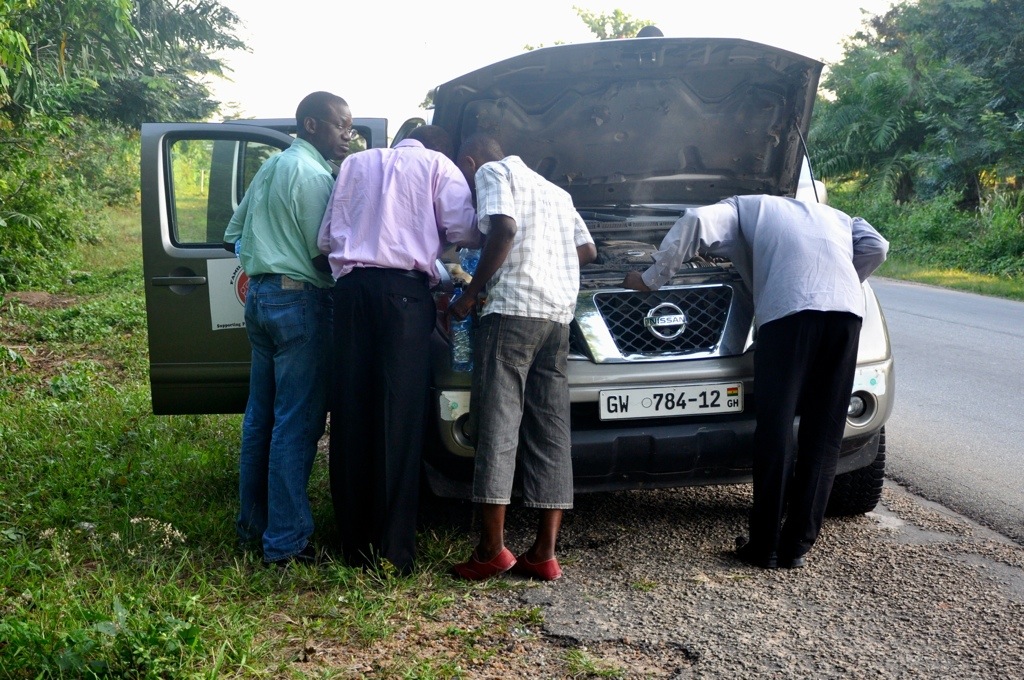
Another three hours remained to Kumasi, two of them now in the dark. About 8:45, some nine hours after we landed in Accra and twenty-seven hours after setting out for O’Hare, we arrived at The Four Villages Inn, our home for the next four or five nights.
Carol and I have stayed there twice, and it’s very comfortable and homey. We were greeted by Chris, the Canadian proprietor. His wife, Charity, who is Ghanaian, doubles as a wonderful cook. Tonight the gumbo was particularly fabulous, and I had two bowls, complemented by two large, cold Star Beers, the local brew. Also greeting us at the Inn were Ida, her son Joe Jr, and later, her son, Daniel, who we had met in Chicago. Dr Annie, lively as always, was there as well. Everyone asked about and said they missed Carol.
The dinner conversation was delightful, and involved different combinations of people talking to one another at different times. I think my favorite piece of it was Dr. Annie and Funmi talking about how on Funmi’s earlier trip this year, they’d been having breakfast at the very table we were at and encountered a Chinese guest who obviously was in very bad shape. They diagnosed the case as malaria, prescribed treatment, Funmi gave up her room for him and by the next day, he was a very lucky fellow, well on his way to recovery.
Peter and the others arrived about an hour later to join us. After visiting with them for a while, we all retired, quite exhausted and likely to sleep very well indeed.
I promise that tomorrow will be a more interesting look at Ghana, rather than a catalogue of our travails.
August 23, 2012
Not sure whether blogging ethicists would condone this pre-trip post, but I have my reasons for doing it, and I should at least get a few points for being up front.
I’m taking off for Ghana in two days, my third trip in as many years. Some of you may have followed one or both of the prior trips. If you haven’t, and would like some further background, you can find links to the blogs for the past two years in the margin of this blog. Even without that background, though, this blog should stand on its own, like the third novel in a series.
And, though this is no novel–the characters are real and unaltered–the story that unfolds has something of the feel of a novel or, put differently, the reality of the Ghana life experience gives to the lives we lead in the West a sense of the fictional. If that does not make sense now, perhaps it will by the end of this trip. Or, perhaps not.
I want to introduce some of the cast of characters now, so that you can begin to get to know them. From time to time, you may want to refer back to this post to refresh your recollection of the people I refer to in the blog.
This trip will differ in a couple of important respects from the two prior trips.
First, the trip has a different and more focused purpose. To date, the Kipharts’ (of which, more soon) work in Ghana has evolved from the digging of wells in selected rural communities to the additions of wings to schools and aid to medical clinics and last year, to the creation of a commercial pineapple-growing venture. The growth of their work has been somewhat topsy-like, expanding as additional needs and opportunities have been identified. In the six months prior to this trip, though, the Kipharts’ thinking has shifted to a more focused, organized and holistic attempt to create sustainable communities that combine economic growth with clean water, health and education in largely-forgotten, small, rural areas in Ghana. This trip will be an attempt to shape and start one or more “circles of sustainability” (as Susie Kiphart refers to them) in these rural areas.
Second, the cast of characters has changed somewhat. One important member of the two prior trips, my wife Carol, will not be along, because the trip is too close to the prospective birth of our fifth grandchild in Atlanta (who is due October 4) for her comfort. Of course we all, especially me, will miss Carol’s presence, though we know that she will be with us in spirit.
Joining the trip, will be Funmi and Sola Olopade, two Nigerian doctors who run the Global Health Initiative at the University of Chicago. The Olopades have become good friends of the Kipharts and have been influential in shaping their new thinking. Carol and I have been privileged to get to know the Olopades over three or four meetings with the Kipharts. (The Olopades just returned from a family trip to Tanzania, where they climbed Kilimanjaro.). Funmi has been to Ghana with another friend of the Kipharts, Marta Segu, whose foundation in Spain has provided financial support to the Kumasi Clinic, run by Dr. Annie. Sola (pronounced “Shola”) is making his first trip to Ghana with us. Marta will not be with us, though she’s been an active contributor to the robust email communication that has preceded the trip. (As part of their more focused thinking, the Kipharts are approaching some others to help fund and leverage their work. In addition to Grifols, the Spanish Foundation, they have applied to the Ronald McDonald Foundation in the U.S. for support.)
Much of the cast of characters in Ghana, is unchanged. The Kipharts, Dick and Susie, have been our close friends for some forty years. Dick is a very successful investment banker and investor and Susie is a graduate of the Erikson Institute for early childhood development in Chicago. They have been traveling to Ghana for nine years, and have established close, caring, respectful relationships with tribal chiefs over that period, through the shepherding of the point person for all of their Ghana operations, Peter Eduful, who they met when Peter was studying at the University of Chicago. Peter is a former Ghanaian government official in the department of education who now works full time with the Kipharts , attending to all of the details and logistics of the work they do in Ghana and guiding them expertly through potential cultural, governmental and economic minefields.
Dr Annie, who is from Madagascar and received her medical training in the Ukraine, is the irrepressible leader of the Kumasi Clinic that provides medical treatment to mothers and babies in and around Kumasi. If her energy could be harnessed and converted to electricity, it could power the entire country.
Working with Peter is the construction head, Alex, whose smile radiates warmth and love to all who see it. Peter’s nephews, Freedom and Jonathan, oversee maintenance of the wells, provide liaisons to the villages and drive the trucks we ride in when we visit Ghana. They help wherever needed and are constantly upbeat and smiling.
Joe Kwarteng, dean of the school of agriculture at Cape Coast University, is Dick’s partner in the pineapple business. Joe’s wife, Ida, runs an NGO with Joe that puts school farms in rural schools and works closely with a school for the deaf, some of whose graduates are employed in the pineapple business. Joe is Ghanaian; Ida grew up half in Lebanon and half in the US. So, of course, Joe and Ida met as students at The Ohio State University.
There are other “players” as well, but I’ll wait to introduce them as we go along, so as not to overwhelm you at the outset.
Look forward to sharing what I’m certain will be an unforgettable trip with you.
As I want to test adding a photo and, of course, have none from a trip that has not yet begun, I’ll shamelessly share two photos of grandchildren, the first (from left to right) of Phoebe, Riley and Zoe and the second of Jasper, with his grandpa, brandishing the rewards they’ve received for both being good boys for their joint haircut.
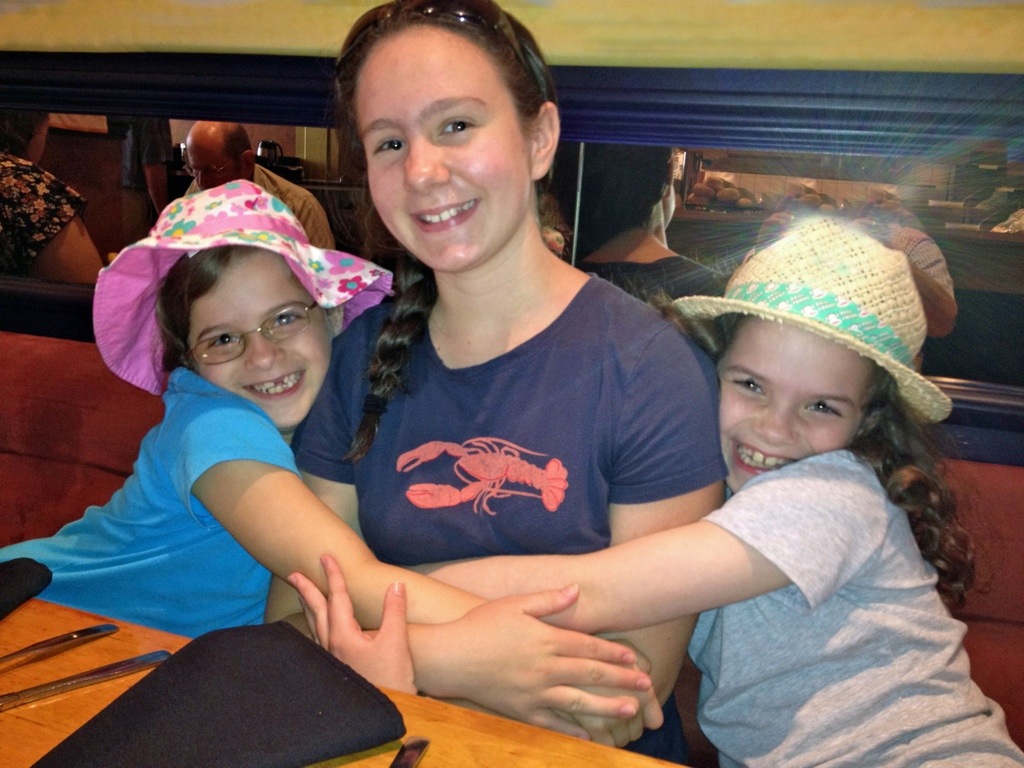
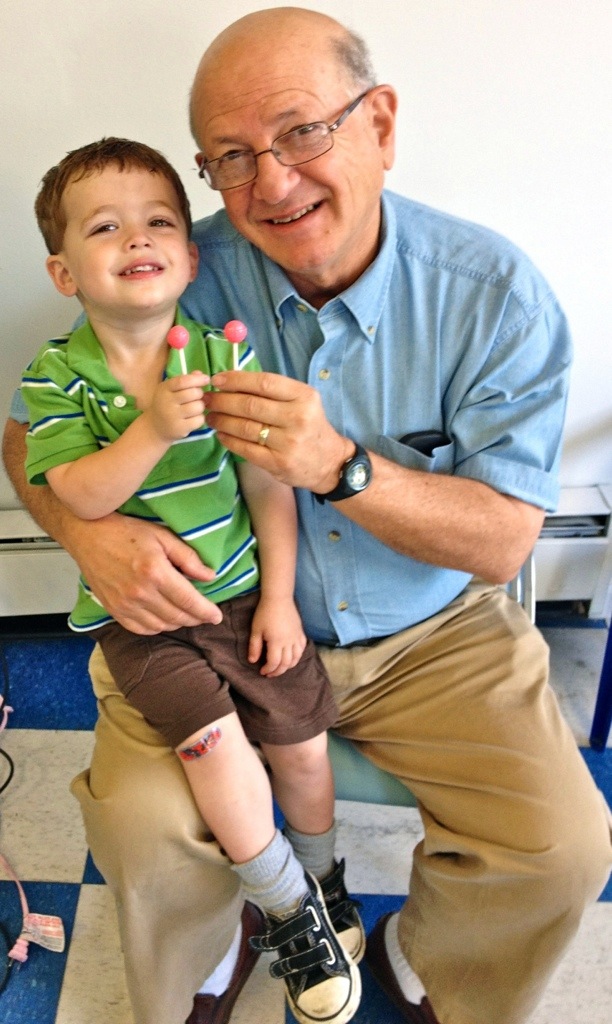
|
|


















